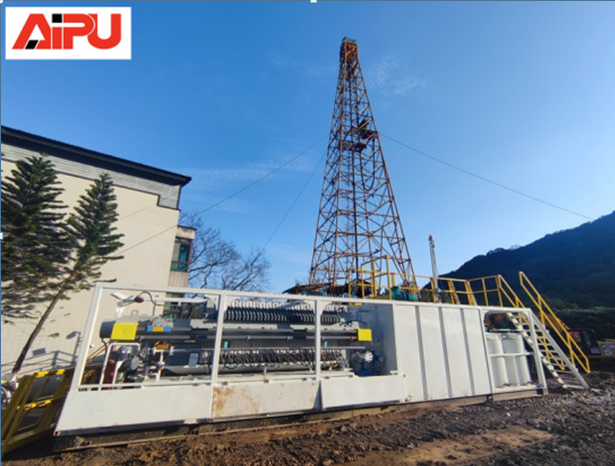Revolutionizing Drilling with Efficient Solids Management
The drilling industry has witnessed a significant transformation with the advent of the solids control system. This innovative technology has emerged as a game - changer, enhancing the efficiency, safety, and environmental sustainability of drilling operations.
Understanding the Solids Control System
The solids control system is a set of equipment designed to separate and remove unwanted solids from the drilling fluid, also known as mud. It typically consists of several components, including shale shakers, desanders, desilters, centrifuges, and mud cleaners. The primary function of these components is to maintain the quality of the drilling fluid by removing cuttings, sand, and other solid particles. This ensures that the drilling fluid can effectively perform its functions, such as cooling the drill bit, carrying cuttings to the surface, and maintaining wellbore stability.
Benefits in Efficiency
One of the most significant advantages of the solids control system is its ability to improve drilling efficiency. By removing solids from the drilling fluid, the system reduces the wear and tear on the drilling equipment. This leads to fewer breakdowns and less downtime for maintenance, allowing drilling operations to proceed more smoothly and quickly. Additionally, a clean drilling fluid has better lubricating properties, which reduces friction between the drill string and the wellbore. This results in lower energy consumption and faster drilling rates, ultimately saving time and costs for drilling companies.
Enhanced Safety
Safety is a top priority in the drilling industry, and the solids control system plays a crucial role in this aspect. Uncontrolled solids in the drilling fluid can cause blockages in the wellbore, leading to pressure surges and potential blowouts. The solids control system helps prevent such dangerous situations by continuously removing solids and maintaining the proper flow and pressure of the drilling fluid. Moreover, a clean drilling fluid reduces the risk of corrosion and erosion of the wellbore and equipment, which can also pose safety hazards. By ensuring the integrity of the drilling equipment and wellbore, the solids control system provides a safer working environment for drilling personnel.
Environmental Sustainability
In today's world, environmental concerns are at the forefront of many industries, and the drilling industry is no exception. The solids control system contributes to environmental sustainability by reducing the amount of waste generated during drilling operations. By separating and removing solids from the drilling fluid, the system allows for the reuse of the fluid, minimizing the need for fresh water and chemicals. This not only conserves natural resources but also reduces the environmental impact of drilling waste disposal. Additionally, the proper handling and disposal of the separated solids can be more effectively managed, reducing the risk of soil and water contamination.
In conclusion, the solids control system has truly revolutionized the drilling industry. Its ability to improve efficiency, enhance safety, and promote environmental sustainability makes it an indispensable tool for modern drilling operations.

Understanding the Solids Control System
The solids control system is a set of equipment designed to separate and remove unwanted solids from the drilling fluid, also known as mud. It typically consists of several components, including shale shakers, desanders, desilters, centrifuges, and mud cleaners. The primary function of these components is to maintain the quality of the drilling fluid by removing cuttings, sand, and other solid particles. This ensures that the drilling fluid can effectively perform its functions, such as cooling the drill bit, carrying cuttings to the surface, and maintaining wellbore stability.
Benefits in Efficiency
One of the most significant advantages of the solids control system is its ability to improve drilling efficiency. By removing solids from the drilling fluid, the system reduces the wear and tear on the drilling equipment. This leads to fewer breakdowns and less downtime for maintenance, allowing drilling operations to proceed more smoothly and quickly. Additionally, a clean drilling fluid has better lubricating properties, which reduces friction between the drill string and the wellbore. This results in lower energy consumption and faster drilling rates, ultimately saving time and costs for drilling companies.
Enhanced Safety
Safety is a top priority in the drilling industry, and the solids control system plays a crucial role in this aspect. Uncontrolled solids in the drilling fluid can cause blockages in the wellbore, leading to pressure surges and potential blowouts. The solids control system helps prevent such dangerous situations by continuously removing solids and maintaining the proper flow and pressure of the drilling fluid. Moreover, a clean drilling fluid reduces the risk of corrosion and erosion of the wellbore and equipment, which can also pose safety hazards. By ensuring the integrity of the drilling equipment and wellbore, the solids control system provides a safer working environment for drilling personnel.
Environmental Sustainability
In today's world, environmental concerns are at the forefront of many industries, and the drilling industry is no exception. The solids control system contributes to environmental sustainability by reducing the amount of waste generated during drilling operations. By separating and removing solids from the drilling fluid, the system allows for the reuse of the fluid, minimizing the need for fresh water and chemicals. This not only conserves natural resources but also reduces the environmental impact of drilling waste disposal. Additionally, the proper handling and disposal of the separated solids can be more effectively managed, reducing the risk of soil and water contamination.
In conclusion, the solids control system has truly revolutionized the drilling industry. Its ability to improve efficiency, enhance safety, and promote environmental sustainability makes it an indispensable tool for modern drilling operations.








